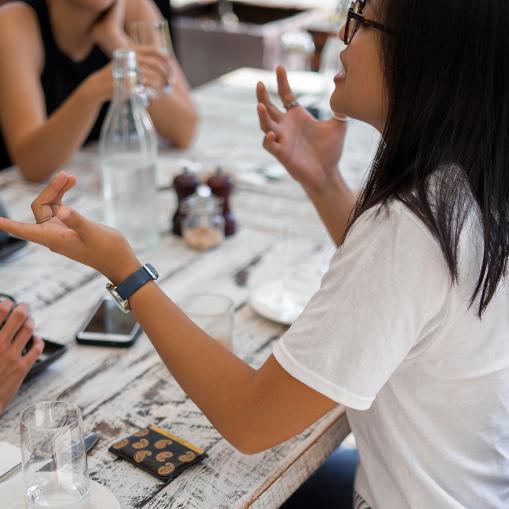College can be an opportune time to build life-long skills for interacting with others. Students may find they need additional skills to engage, sustain and when necessary, transition relationships with:
- Friends, roommates, classmates
- Significant others, intimate partners
- Family
- Faculty
- Employers
Yet even the Leaders and Best wrestle with how to navigate relationships. People are complicated, and relationships are often uncertain and ambiguous. We each bring our own cultural and family perspectives into the mix. Technology facilitates connection but may make those connections seem impersonal or superficial.
As a result, students sometimes struggle to make friends and other meaningful connections, experience alienation and loneliness and question whether they belong. Of course, these feelings are not limited to U-M students or college students in general, however, college is an ideal time to develop resilience in the face of these challenges.
Unsurprisingly, many students struggle with conflict that can arise in relationships. They may feel anxious, uncertain and at a loss for what to do when conflict arises. They can feel reluctant to “rock the boat.” Students may also at times ignore their own feelings, wants, and needs, especially while favoring the seeming short-term ease of avoidance, despite the long-term impact on their well-being. In fact, the common phrase “You do you and I’ll do me” acknowledges each person’s autonomy but avoids exploration of where “you” and “me” may experience discord.
The Office of Student Conflict Resolution (OSCR) helps students understand that conflict occurs when needs aren’t being met. They help students identify their own dominant conflict style(s) to illuminate and explore the various options students have when navigating relationships. The five conflict styles are:
- Avoider - I lose, you lose
- Accommodator - I lose, you win
- Competitor - I win, you lose
- Compromiser - We both win some and lose some
- Collaborator - Asks “How can we both get what we want?” We both win
OSCR also suggests a simple framework, called Nonviolent Communication, to help communicate during conflicts, specifically:
- Observation: State objective, unbiased facts
- Feelings: Share emotions, not thoughts of judgments couched as feelings
- Needs: Share basic universal needs that others may relate to
- Requests: Ask for what will help to fix the conflict, and avoid demands
Using this framework, a conversation between roommates might begin: I noticed you left the lights on after 11 last night. I felt restless because I can’t sleep with the lights on, and I need to sleep to feel well-rested. Can we agree on a lights-out schedule?
Given the shifting environment of college, positive family relationships can mean a lot. You might want to talk with your student about their relationships. You could ask, listen, normalize any struggle, and offer support, for example:
- How’s your social life on campus?
- Tell me about your sense of belonging?
- How are you and your friends at supporting each other?
- How’s the balance between social life, academics and self-care?
- What if any kinds of conflicts arise for you, and what do you notice about your conflict style? (You might want to identify your own conflict style too!)
- How does technology support your relationships? How does it get in the way?
- How do your values affect your friendships and other relationships?
- Would you want to consider using a university resource? (below)
The university offers a wide array of resources for education and support related to relationships:
- Counseling and Psychological Services (CAPS): Individual and couples counseling, group workshops and more
- First Year Experience for incoming undergraduate students:
- Relationship Remix invites students to reflect on personal values, discuss healthy relationships, and practice skills related to communication
- Change It Up! introduces students to bystander intervention skills with the purpose of building inclusive and respectful communities
- Ginsberg Center: Offers many ways for students to engage together including Alternative Spring Breaks
- Multi-Ethnic Student Affairs: Builds inclusive spaces and equitable opportunities for all
- Office of Student Conflict Resolution: Provides support for conflict resolution including individual coaching
- Recreational Sports: Students can join intramural teams and go on group outdoor adventures
- Sexual Assault Prevention and Awareness Center: Promotes healthy relationships, teaches non-violence and equality, supports survivor healing, and fosters a respectful and safe environment
- Trotter Multicultural Center: Serves as a campus facilitator, convener, and coordinator of intercultural engagement and inclusive leadership education
- University Career Center: Helps students develop career skills e.g. for networking and interviewing
- University Housing: Fosters connection and supports diversity, equity and inclusion
- Wolverine Wellness: Wellness Coaching and more
- Wolverine Support Network: U-M students “create an inclusive community and support each other’s identity, mental well-being, and day-to-day lives through peer-facilitated groups and bi-weekly community events”

